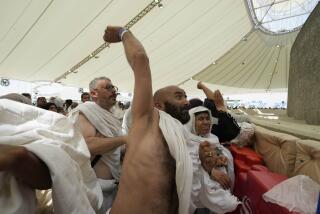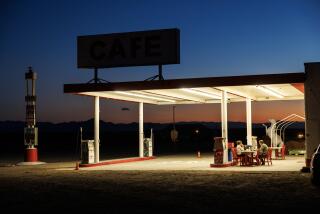Saudi Truck Stop an Oasis for GIs on the Road to War : Crossroads: The service station-general store offers gas at 55 cents a gallon. Arab travelers stop to pray.
- Share via
ON THE ROAD TO KUWAIT, Saudi Arabia — It’s like no other truck stop on no other highway.
This is where great armies of America and Britain and the other nations of the anti-Iraq coalition stop for a Pepsi or a radiator clamp or just a stretch of the legs on the advance north.
Arab travelers and farmers pause and pray during holy hours at the truck stop’s ramshackle mosque annex. Nomadic Bedouin camel drivers pass by alone, seeming to need little, their exotic wandering herds of one-hump dromedaries posing more of a hazard for transportation convoys than Saddam Hussein’s dispersing air force.
Here at the Al Buanain truck stop, a Saudi security agent can wash his car and get a haircut and a meal.
Spread across five acres of scrub and sand dunes of Eastern Saudi Arabia, this truck stop is to the 20th Century what the oasis was to travelers of the centuries before: the crossroads in a barren land.
It offers water and everything else--from gasoline at the equivalent of 55 cents-a-gallon to men’s dress shoes that buyers pick out of a cardboard bin, hoping to find two the same. And surely someone buys the whole frozen catfish stacked in the freezer, or why else would they be imported from Thailand?
“It’s a little comical, indeed. Not really the thing you expect to be doing in war--stopping at a big service station,” said Lance Cpl. Michael Smith, of South Shields, England. Smith, a burly shaved-head trooper with England’s Four Brigade, was riding shotgun in a truck painted with a scorpion on the side when he stopped for a rest.
He was about as ready for combat as anyone can be. “Blood Group O,” he had tattooed on his forearm. Taped inside the cab of his truck was a picture of his wife and a 2-week-old baby he has never held. A child’s stuffed bear nestled in the cab alongside his rifle. Like dozens of other men and women coming and going from busy Al Buanain, Smith is surrounded with two visions he cannot escape: The family he misses and the war just up the road.
But what is a soldier to do?
The imagination is already spun dry. The vast horizon holds no friendly mirages, just helicopters thwacking through the gun-metal sky of winter and strings of convoys rumbling up the road with every kind and color of gun and tank and carrier and truck. American-made M-1 tanks ride on flat-beds; troops ride in school buses. Ruts are worn a foot deep into the pavement of the six-lane highway from the weight of the killing machines. If the U.S. war effort costs $300 million a day, here is a vantage point on the reason.
“What I do out here is I try not to think at all,” said Cpl. Smith.
A luxury Mercedes-Benz sedan stops not far from a 10-ton tractor convoy. Arab women emerge from the back seat, behind smoked windows, only after adjusting veils that hide all but a slit for the eyes. There will be no interviews or chit-chat with them. This may be a crossroads, but it’s no melting pot.
But men of Alabama National Guard’s 644th Ordnance Company are anxious to talk. The cabs of their giant tractor-trailer rigs are so loud that only at the rest stop can they even hear themselves think. And it’s a 10-hour ride to the front lines.
“Most of the ride, there’s not much to do but look at the camels and sometimes a tent or two,” said Staff Sgt. Johnny Boyce of Pine Level, Ala., his ears still ringing.
They are carrying supplies and a D-9 Caterpillar, the kind that’s apt to be sent first across the border into Kuwait to try and knock down Iraqi fortifications and sweep away land mines.
“When 15 tons of bulldozer hits a mine, the ‘dozer jumps about this high,” said Sgt. Jay Armstrong of Birmingham, Ala., spreading his hands about 12 inches apart.
Many Army divisions have repainted their trucks and tanks a sand-brown color. The Alabama Guard heads to battle in the green and black colors of jungle camouflage.
“They told us it wouldn’t matter about color, that his missiles are heat-seeking. But this thing stands out here like it was painted red and orange. I dunno,” shrugged Specialist Steve Hauerwas of Millport, Ala.
Inside, the truck stop is transformed into an exotic, jumbled and overstocked mini-mart. Soldiers browsed past a handful of belts, a pair of gasoline generators, sacks of grains, acres of Pepsi and bottled water, ink pens, prayer beads, beach towels, slippers, wallets, chili peppers and chalices. A British soldier, rifle slung over one shoulder, walks out carrying a Hitachi stereo tape-player.
For many, this will be their last stop outside a military encampment for who knows how long.
“I can’t get over it. There aren’t many places where you see a church (mosque) at a truck stop. You drive by here in the evenings, and the people are all praying,” said Marine Sgt. Scott Hoffman, of Camp Pendleton and Joliet, Ill. Marines from the 3d LAAD Battalion, an antiaircraft unit, are discouraged from trying to mix with Saudis, but he has no choice. A radiator hose has burst in his jeep-like vehicle, called a Humvee.
Hoffman’s Humvee is not the only casualty of this round-the-clock advance of men and materiel. Disabled trucks litter the highway. Some drivers are unlucky and don’t make the truck stop.
A few miles north, closer to Kuwait, Army Specialists Tom Malone, of Childersburg, Ala., and David Arceo, of Ft. Ord, are stretched out on a beach cot. They have been here a day and a half after two tires melted on their transport truck from the weight of carrying a 60-ton Chieftain Mark-6 mobile bridge-builder.
They have set up camp on the roadside, with a battery-powered stereo, bottles of hot soda, an M-16 with two clips and a set of dominoes.
“This makes four places I’ve been in my life,” said Arceo. “I’ve been to Texas and California, Germany and here.”
Then, echoing the lament of soldiers down through time, he added, “Here sucks.”
More to Read
Sign up for Essential California
The most important California stories and recommendations in your inbox every morning.
You may occasionally receive promotional content from the Los Angeles Times.













